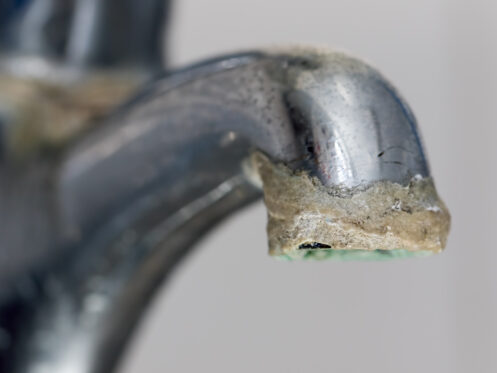According to the U.S. Department of Energy, hard water refers to water with a high mineral content. This mineral content can cause buildup to accumulate on appliances, fixtures, and dishware. It can also impact each aspect of cooking from baking to brewing coffee. But what can Indiana residents do about hard water in the household? A deep dive into how hard water affects cooking can provide guidance as you prepare meals as well as safeguard your time in the kitchen.
Why Does Indiana Have Hard Water?
Hard water forms when groundwater flows through geographical formations like limestone, chalk, or gypsum. These types of soil are high in calcium carbonate and magnesium carbonate. When the minerals dissolve, they help create hard water. According to the Department of Energy, scientists measure hard water in grains per gallon (GPG) or parts per million (PPM). For example, a measurement of 0–3.0 GPG is soft water, 3.5–7.0 GPG is moderate water, and 7.5-10.0 GPG is hard water. Anything above 10.0 GPG is very hard water, and homeowners should consider using water filtration and water softeners to help mitigate the negative effects of this condition.
According to the Indiana Department of Water, the state’s water supply flows or percolates through limestone bedrock and has one of the highest concentrations of calcium carbonate in the nation. With an average measurement of 14.0 GPG, Indiana supplies very hard or extremely hard water to homes. Similarly, any measurement above 200 PPM is very hard water, and the average water hardness for the state of Indiana is 262 PPM. Indianapolis is the largest municipality in Indiana, and the metro area has an average water hardness of 274 PPM. This water hardness can affect everyday household activities from cleaning to cooking.
How Does Hard Water Impact Cooking?
Hard water affects every step of cooking from preparation to the final appearance and presentation of your recipe. Major ways in which hard water impacts cooking include boiling and baking as well as the quality of coffee, pasta, sauces, and other drinks.
Impact on Boiling
The presence of hard water influences boiling along with any dish prepared on the burner or stove. When you heat hard water, the minerals in the water can elevate its boiling point. This means that it can take much longer for the water to boil. You might find yourself waiting an eternity to boil dry goods like beans or rice. The higher boiling point can alter the timing of cooking and hamper your ability to follow exact recipes, potentially resulting in improperly cooked or unpalatable food.
Impact on Baking
Did you know that baking is largely a chemical process? When you bake cake or cookies, for example, ingredients like butter fat, egg or wheat protein, and sodium bicarbonate all react with heat to produce baked goodies with the right texture and structure. The water in batter is even responsible for the air bubbles that produce baked goods with just the right amount of fluffiness. However, the high concentration of dissolved minerals in hard water can interfere with the chemical reactions necessary for successful baking. It can bind to active yeast and alter the structure of gluten.
A major complaint of baking with hard water is that it causes baked goods to become tough or chewy. This happens because minerals in hard water react with proteins in flour and cause them to become more complex. You may also find that baked goods are denser than they would have been with soft water. The minerals in hard water can also neutralize the acidity required for leavening. This means that cakes, bread, and other baked goods may not rise in the oven as expected.
Impact on Coffee or Tea
Hard water leaves behind mineral residue in coffeemakers or kettles. These minerals can interfere with the potency of flavor from coffee beans or tea leaves. This means that you may end up with a weaker cup of coffee along with a salty or metallic taste. The minerals in hard water can also clog appliances over time and necessitate premature replacements.
Impact on Texture
The minerals in hard water can produce fast chemical reactions that change the texture of food. For example, steamed leafy vegetables may feel soggy or overly blanched when exposed to hard water. On the other hand, hard water can make starchy vegetables overly tough. Pasta or noodles can also end up with a rubbery texture.
Impact on Flavor
In addition to food texture, hard water can also change the flavor of recipes. The mineral concentration of hard water can react to mineral compounds naturally present in fruits, vegetables, or spices. This can make harvested ingredients taste bitter. Rice and pasta can also absorb the minerals found in hard water and produce a metallic taste. Finally, hard water can alter the intended flavor profile of sauces and toppings. Even the slightest variation in the concentration of calcium, magnesium, chlorides, or sulfates can change the composition of a dipping sauce completely.
Impact on Nutrients
Importantly, hard water can affect the nutritional value of food. Minerals in hard water readily bind to nutrients like iron, zinc, and manganese. This makes it harder for your body to absorb these vital minerals. Even if you cook with nutrient-rich ingredients, hard water reduces the estimated nutrient content, and you may not reap the intended health benefits.
Impact on Cookware and Cutlery
Hard water can cause limescale to accumulate on pots, pans, and tableware. The residue can cause unsightly stains and result in using your dishwasher more frequently than expected. You may also need to replace flatware and utensils earlier than expected, the the additional expenses can add up for your kitchen budget.
What Can I Do About My Household’s Hard Water?
Hard water is often the result of the geology of a region. While you cannot change the Earth’s composition, you can obtain professional help for dealing with hard water. According to the Department of Energy, the first step is to reach out to a local plumber for water testing. The plumber can help determine the concentration of dissolved minerals that flow from your faucets. Based on the severity of the problem, the plumber can also offer solutions like whole-home water filtration, whole-home water softeners, or reverse osmosis systems.
Water Filtration
Whole-home water filtration helps remove large minerals and contaminants from water. In addition to dissolved molecules like mineral carbonates, whole-home filters can remove dangerous metals like lead. This form of filtration can also remove dirt and sediment. Asking a plumber to install whole-home filtration can offer peace of mind that debris and toxins will not interfere with your cooking.
Water Softeners
Water softeners use a process called ion exchange to remove minerals like calcium and magnesium. The process replaces these minerals with other compounds like potassium chloride. Softener systems can make water feel silkier and moisturizing. They also help ensure that water flowing from kitchen sinks has a lower mineral content for food preparation.
Reverse Osmosis Systems
A reverse osmosis system uses a semi-permeable membrane to remove impurities from water. In addition, it uses a series of filters to strain water intended for human consumption. Allowing a plumber to install a reverse osmosis system can help ensure that filtered water is always available for drinking or cooking your favorite foods.
Contact Us Today
According to the US Geological Survey, up to 85% of U.S. homes have hard water. The state of Indiana is notorious for falling under this category and for having some of the hardest water in the nation. Fortunately, experts can help. Hope Plumbing provides hard water solutions for homes located in Indianapolis and surrounding areas. We offer whole-home water filtration, water softener installation, and reverse osmosis systems. Our plumbers can install the right whole-home systems to mitigate water hardness that naturally flows in from groundwater sources. If your pipes have already suffered the consequences of hard water, we also conduct plumbing repairs. Reach out to us for drain cleaning, leak detection, plumbing inspections, and re-piping services. No matter the diagnosis, we can help with any pipe problems that result from exposure to high mineral content. If you need help dealing with Indianapolis hard water, contact Hope Plumbing today for all plumbing needs.

